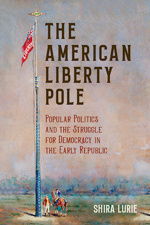Today, we are happy to bring you our conversation with Shira Lurie, author of The American Liberty Pole: Popular Politics and the Struggle for Democracy in the Early Republic.
What inspired you to write this book?
The first draft of this book was my PhD dissertation. I arrived at grad school interested in how early Americans made sense of their relationship to their new government - how they saw their new political role as citizens, not subjects. I was especially interested in events like the Whiskey Rebellion and Fries’s Rebellion, when the relationship between government and the people was put to some early tests. My advisor suggested I look into liberty poles and then I was off and running!
What did you learn and what are you hoping readers will learn from your book?
Above all, I learned that American political culture has been messy, contested, and changeable from the start. Americans are often tempted to think of the Founding Era as laying out the blueprint for American politics and that what ails American democracy today can be cured by returning to first principles. But studying early American politics, and liberty poles in particular, shows that there was no stable, consensual, universal understanding of how the American experiment in republicanism should be carried out in practice. Americans fought then, as they do now, over what it means to live under a government of the people.
What surprised you the most in the process of writing your book?
I began this project in 2014, and with each passing year, it became more and more relevant to contemporary American politics. I was, and continue to be, surprised by how often Americans are rehashing the same debates over protest, monuments, partisan polarization, elections, and the First Amendment that I found in my research.
What’s your favorite anecdote from your book?
Asking an author this question is like asking a parent to pick their favourite child. A mock funeral procession for liberty, a whipping of a newspaper editor who won’t give up his sources, an itinerant preacher who riles up a crowd and then flees town - how could I ever choose?!
What’s next?
My next book project will look at anxieties over fraud and authenticity in early American politics. I’m interested in how early Americans’ obsession with political trickery was embedded in a myth of consensus – the belief that the citizenry largely agreed on all major issues and any divisions in American society were the result of politicians who peddled misinformation, misunderstanding, and false promises.





